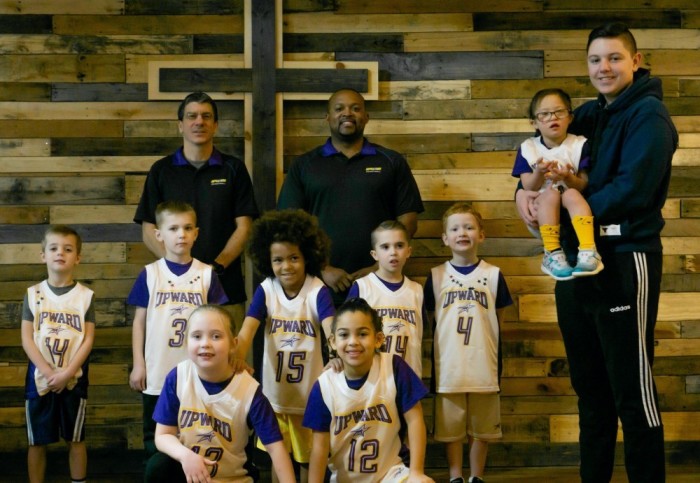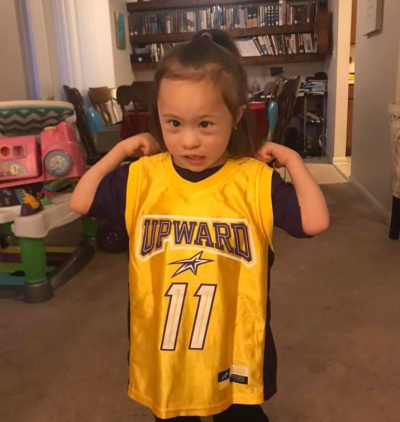National Disability Day: Let the Church be the best at serving these families

Today is National Disability Day, a time to raise awareness about the challenges faced by people with disabilities. As Christians, we need to be aware of these challenges and we should strive to serve these families better than any entity in society.
I speak as someone who knows about children with disabilities first hand. When my wife, Michele, was pregnant with our daughter Alli, our baby had only half a heart as well as Down Syndrome. She was missing the entire left side of her heart as well as the aortic arch. We were told that if she made it to birth, she would probably have a massive heart attack.
But a miracle happened and Alli suddenly grew the left side of her heart and the aortic arch right before we were preparing to travel to Boston to do prenatal cardiac surgery.
Alli continued to face challenges during her birth and the months after, having to feed through a tube because she was too weak to eat by mouth. Throughout her toddler years she was smaller than anyone else in her class. But by aged 5, she joined a basketball team for the first time, and that decision led me to start sports team for children with special needs.

I was asked to direct my church’s Upward Sports league two years ago. I made the decision to make it the first basketball and flag football league in our region accessible to kids with differing abilities – putting neurotypical kids on the same teams as those with Down Syndrome, autism, anxiety, and physical disabilities. Erie County in western New York has a large concentration of special needs children, but there was no athletic program for these kids nearby.
At first, I wasn’t sure how the community would receive it. Over the years, sports have become increasingly individualized, with a growing pressure on even young kids to become top-performing athletes. I didn’t want parents or their children to feel like they weren’t learning the skills they wanted to learn. So, I went into this with mixed expectations. I wasn’t prepared for the overwhelming support for the program, from both parents and players.
Alli’s teammates, and the teammates of other children with special needs in the program, have rallied around them. So have their opponents, who often let Alli shoot past them to make baskets, even if it means losing a point.
On the court, Alli has a “buddy” named Michael, a junior in high school. He’d never met her before this year, but he’s one of the many older kids and adults who have volunteered to be a part of the program. Instead of being out with his friends or watching television on Saturday mornings, he’s in the gym with Alli. He stays with her during practices and games and lifts her up to throw the ball, since she doesn’t have the muscle tone for her shot to consistently reach the basket.
Many of our players with special needs have volunteers like this, who hold their hands when they’re overwhelmed, or run with them when they’re overstimulated. On the teams with older kids, the players themselves take on the buddy roles, noticing when their teammates with special needs require help or encouragement.
This is the first time Alli and kids like her have had the chance to be part of a team in our community. The beautiful thing about her and other kids with special needs is that they are able to see people without prejudice; they don’t see what makes people different, but they just see what makes them human. When someone mistreats Alli or makes a rude comment, which sometimes happens, she’ll smile just as kindly at that person as she does at everyone else.
God knitted all of us in our mother's womb, and we therefore praise Him, for we are fearfully and wonderfully made (Psalm 139:13-14). This is an opportunity to live out Philippians 2:3 to put the needs of others before our own. This is an opportunity to live out Galatians 6:2, which commands us to bear one another’s burdens. The Bible’s implications to life are endless.
The COVID-19 pandemic has exacerbated the inequalities and lack of access that exists in the special needs community. As churches prepare to reopen and resume programming in 2021, I encourage church leaders to re-evaluate their services to children with differing abilities, and ensure that they are not just welcomed, but embraced.
As coaches and parents in our church sports leagues, we sometimes feel like we’re giving kids like Alli an opportunity. But really, they’re giving an opportunity to us. I’ll often get phone calls from people I’ve never met who have heard about the program, asking how they can help, because we’ve all quickly realized that we’re learning so much more than basketball. I’m grateful for parachurch ministries like Upward Sports that understand how sports ministry is not only a way to bond over a shared love of sports, but also an outlet to foster humility and selflessness and learn how to be better followers of Christ.
Alli will never be a competitive basketball player, and she’ll never win a college sports scholarship. But when she scores a basket, everyone in the gym gets on their feet to cheer for her, and I’ve never seen her look so proud. It’s hard not to think of how, just five years ago, she only had half a heart, and of how fiercely she fought to be shooting baskets just like any other kid.
Children with special needs don’t need to be separated; they need to belong. The church has a calling and unique structure to provide this type of community. I don’t want Alli growing up to feel like she’s different or “less than”, and I never want her to lose the joy she has in being alive.
On National Disability Day, let this be a reminder for our churches to ensure that our programming serves children and people with different abilities, because they are all fearfully and wonderfully made by our God.
Vinh Nguyen is league director of Upward Sports at Cornerstone Church in Grand Island, New York.




























